I would like to use ICommand to change the Paddle1.Y int value of my ViewModel. Am I supposed to create a class implementing ICommand interface? I have done that. But since it is a class, it doesn't have access to my ViewModel's Paddle1 property without creating a property for it. I would prefer to create the command within my ViewModel for this reason. At this point I'm trying to pass the Paddle1 to the Command as a CommandParameter in XAML. I am failing at this, and I'm not sure it is the cleanest approach to editing the state of my ViewModel either.
Could I get a code example of my UpKeyPressed command being bound to either a button or the keyboard up key? With no CommandParameter would be more clean, if the command could access my ViewModel Paddle1 property.
My ViewModel:
namespace Pong.Core.ViewModels
{
public class GamePlayViewModel
{
private readonly Paddle Paddle1;
private Paddle Paddle2;
public GamePlayViewModel()
{
Paddle1 = new Paddle();
Paddle2 = new Paddle();
UpKeyPressed();
}
public ICommand UpKeyPressed()
{
var r = new UpKeyPressed();
r.Execute(Paddle1);
return r;
}
}
public class UpKeyPressed : ICommand
{
public void Execute(object parameter)
{
var paddle = parameter as Paddle;
Debug.Assert(paddle != null, "paddle != null");
paddle.IncreaseY();
Debug.WriteLine(paddle.Y);
}
public bool CanExecute(object parameter)
{
return parameter != null;
}
public event EventHandler CanExecuteChanged;
}
}
My XAML page that uses the viewmodel as a dataContext:
<Window x:Class="Pong.Windows.Views.GamePlayView"
xmlns="http://schemas.microsoft.com/winfx/2006/xaml/presentation"
xmlns:x="http://schemas.microsoft.com/winfx/2006/xaml"
xmlns:local="clr-namespace:Pong.Core.ViewModels;assembly=Pong.Core"
Title="GamePlayView" Height="350" Width="525">
<Grid>
<Button CommandParameter="{Binding ElementName=Paddle1}"
Command="{StaticResource UpKeyPressed}" >
Click
</Button>
</Grid>
<Window.DataContext>
<local:GamePlayViewModel/>
</Window.DataContext>
<Window.InputBindings>
<KeyBinding Command="{Binding Path=UpKeyPressed}"
Key="O"
Modifiers="Control"/>
</Window.InputBindings>
</Window>
Data structure of my solution
My attempt to fix:
namespace Pong.Core.ViewModels
{
public class GamePlayViewModel
{
private readonly Paddle Paddle1;
private Paddle Paddle2;
private ICommand _doSomething;
public ICommand DoSomethingCommand
{
get
{
if (_doSomething == null)
{
_doSomething = new UpKeyPressed(Paddle1);
}
return _doSomething;
}
}
public GamePlayViewModel()
{
Paddle1 = new Paddle();
Paddle2 = new Paddle();
}
}
public class UpKeyPressed : ICommand
{
private Paddle Paddle1;
public UpKeyPressed(Paddle paddle)
{
Paddle1 = paddle;
}
public void Execute(object parameter)
{
//var paddle = parameter as Paddle;
//Debug.Assert(paddle != null, "paddle != null");
//paddle.IncreaseY();
Paddle1.IncreaseY();
//Debug.WriteLine(paddle.Y);
Debug.WriteLine(Paddle1.Y);
}
public bool CanExecute(object parameter)
{
return Paddle1 != null;
}
public event EventHandler CanExecuteChanged;
}
}
XAML attempt (no errors but not workling upon pressing the 'O' key):
<Window x:Class="Pong.Windows.Views.GamePlayView"
xmlns="http://schemas.microsoft.com/winfx/2006/xaml/presentation"
xmlns:x="http://schemas.microsoft.com/winfx/2006/xaml"
xmlns:viewModels="clr-namespace:Pong.Core.ViewModels;assembly=Pong.Core"
Title="GamePlayView" Height="350" Width="525">
<Grid>
</Grid>
<Window.DataContext>
<viewModels:GamePlayViewModel/>
</Window.DataContext>
<Window.InputBindings>
<KeyBinding Command="{Binding DoSomethingCommand}"
Key="O"
Modifiers="Control"/>
</Window.InputBindings>
